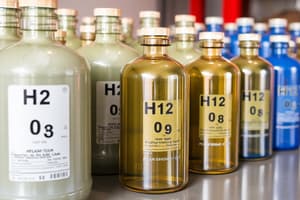Podcast
Questions and Answers
Detonation occurs in a reciprocating aircraft engine when:
Detonation occurs in a reciprocating aircraft engine when:
- Hot spots in the combustion chamber ignite the fuel/air mixture in advance of normal ignition
- The spark plugs are fouled or shorted out or the wiring is defective
- The unburned charge in the cylinders explodes instead of burning normally (correct)
Detonation may occur at high-power settings when:
Detonation may occur at high-power settings when:
- The fuel mixture ignites instantaneously instead of burning progressively and evenly (correct)
- The fuel mixture is ignited too early by hot carbon deposits in the cylinder
- An excessively rich fuel mixture causes an explosive gain in power
If a pilot suspects that the engine (with a fixed-pitch propeller) is detonating during climb-out after takeoff, the initial corrective action to take would be to:
If a pilot suspects that the engine (with a fixed-pitch propeller) is detonating during climb-out after takeoff, the initial corrective action to take would be to:
- Lean the mixture
- Apply carburetor heat
- Lower the nose slightly to increase airspeed (correct)
If the grade of fuel used in an aircraft engine is lower than specified for the engine, it will mostly likely cause:
If the grade of fuel used in an aircraft engine is lower than specified for the engine, it will mostly likely cause:
The uncontrolled firing of the fuel/air charge in advance of normal spark ignition is known as:
The uncontrolled firing of the fuel/air charge in advance of normal spark ignition is known as:
Flashcards are hidden until you start studying
Study Notes
Detonation in Aircraft Engines
- Detonation is defined as the explosion of the fuel/air mixture in the cylinders rather than a normal burn, causing a rapid downward force on the piston.
- Common causes include fouled spark plugs, defective wiring, or hot spots within the combustion chamber triggering premature ignition.
Detonation Under High-Power Settings
- Detonation can occur when the fuel mixture ignites instantaneously, leading to a lack of progressive burning.
- An excessively rich fuel mixture can also lead to explosive power gains, increasing the risk of detonation.
- Early ignition by hot carbon deposits in cylinders is a contributing factor.
Corrective Actions During Detonation
- During climb-out after takeoff, if engine detonation is suspected, the initial step is to lower the nose slightly to boost airspeed and reduce engine load.
- Engine detonation typically results from using poor quality fuel or excessive temperatures.
Impact of Fuel Grade on Engine Performance
- Utilizing a lower grade of fuel than specified for an engine is likely to induce detonation, as lower grades ignite at lower temperatures.
- Higher temperature engines that require a higher grade fuel may cause lower grade fuels to detonate.
Pre-Ignition Defined
- Pre-ignition occurs when the fuel ignites before normal spark ignition, often triggered by excessively hot components, such as exhaust valves or carbon particles.
- It is characterized by ignition in only a few cylinders, differentiating it from detonation, which affects all cylinders under similar conditions.
Studying That Suits You
Use AI to generate personalized quizzes and flashcards to suit your learning preferences.




